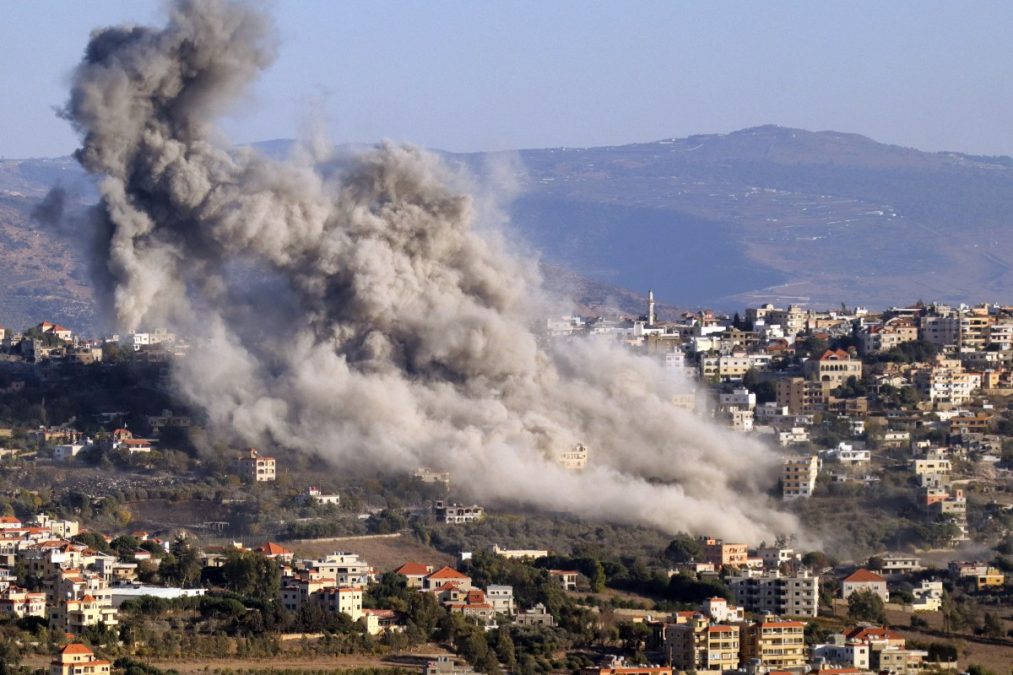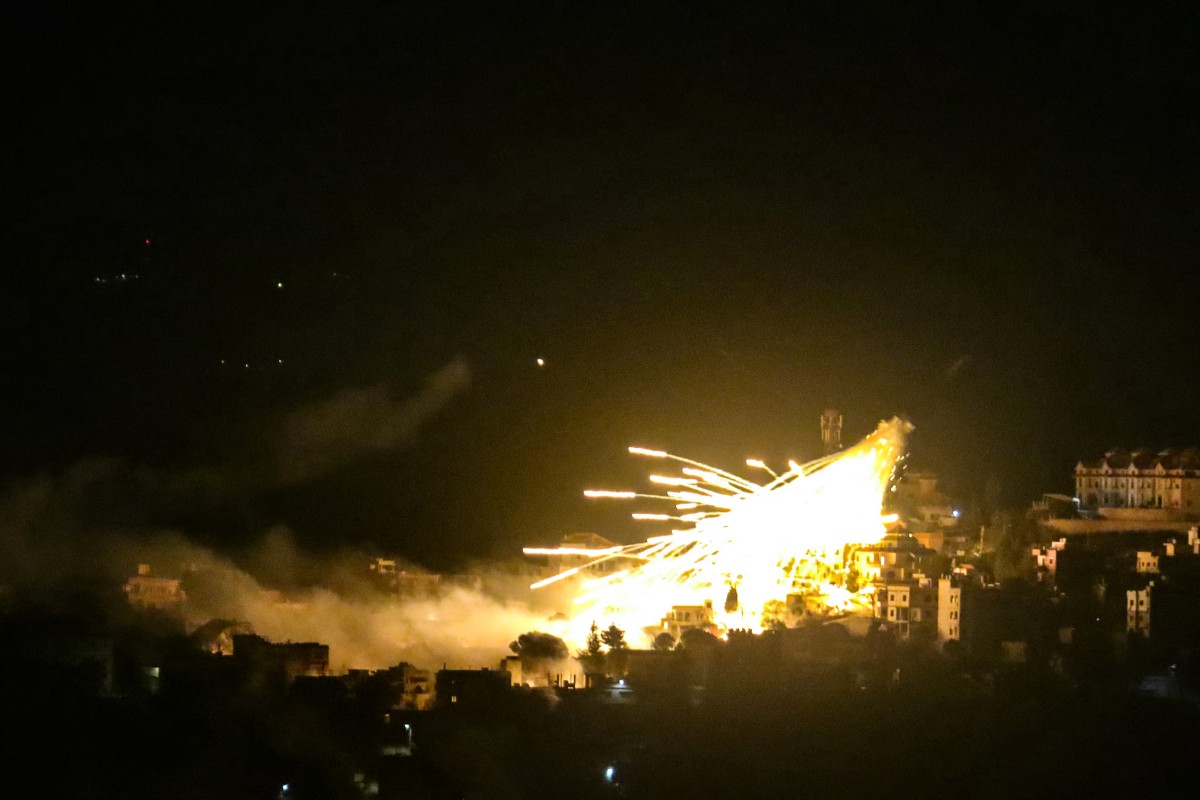Jerusalem, Undefined – Israeli Prime Minister Benjamin Netanyahu met visiting US officials Thursday to discuss a possible deal to end Israel’s war with Hezbollah in Lebanon, as the death toll mounted on both sides of the border.
Netanyahu told Washington envoys Amos Hochstein and Brett McGurk that any Lebanon deal must guarantee Israel’s longer term security.
While their talks took place, Israeli medics and a local leader reported seven Israelis killed by cross-border fire from Lebanon — one of the highest one-day tolls in Israel in more than a year of cross-border exchanges that escalated to full-scale war last month.
Israeli strikes hit southern and eastern Lebanon as well as Gaza, where Israel’s actions in the territory’s north have drawn increasing scrutiny more than a year into its war against Hamas Palestinian militants.
“The prime minister specified that the main issue is not paperwork for this or that deal, but Israel’s determination and capacity to ensure the deal’s application and to prevent any threat to its security from Lebanon,” Netanyahu’s office said.
Israeli Defence Minister Yoav Gallant also met the Americans for a separate discussion.
He said in a statement their talks focused on “security arrangements as these relate to the northern arena and Lebanon, and efforts to ensure the return of 101 hostages still held by Hamas in Gaza”.
Israeli emergency services said a rocket from Lebanon killed two people in a northern olive grove.
Hezbollah willing to bend
More than a month into its war with Israel, Hezbollah says it is ready for a truce, but there are limits to what it can accept after suffering devastating attacks, analysts say.
The Iran-backed group said Wednesday it would accept a ceasefire, if offered and if the terms were “suitable”, acknowledging it had been dealt “painful” blows by Israel.
Also Wednesday, Lebanon’s premier Najib Mikati said he had received signals from US envoy Amos Hochstein that a truce could be reached before the US elections on November 5.
With much of its senior leadership killed and its strongholds pulverised, Hezbollah could use the recovery time that a truce would offer.
A ceasefire is a “priority” for Hezbollah so it can “reorganise its ranks”, said Qassim Qassir, a Lebanese analyst close to the group.
“It will agree to the deployment of the army (in south Lebanon) and to stay away from the borders, but nothing more than that,” he told AFP, referring to Israeli demands for Hezbollah to retreat some 30 kilometres (20 miles) from the frontier.
Hezbollah, which began trading cross-border fire with Israel last year in support of its Palestinian ally Hamas, has found itself on the back foot since all-out war erupted on September 23.

Israel has assassinated the group’s most senior leaders, including its chief Hassan Nasrallah and Hashem Safieddine, tipped as his successor.
The killings created a month-long vacuum at the top, as targeted strikes on hideouts across the country suggested an intelligence breach.
On the ground, Israeli forces have advanced as far as the town of Khiam, some six kilometres (four miles) from the border.
Hezbollah says the Israelis have yet to fully control any frontier village.
‘Withdraw fighters’
In Lebanon’s east, Hezbollah infrastructure, including underground tunnels and weapon supply lines from Syria, have come under attack, Israel’s military says.
At least two out of six land crossings with Syria have been closed after Israeli strikes, and aircraft operated by Hezbollah-backer Iran are banned from landing in Lebanon’s only airport, Beirut.
Hezbollah “has been considerably weakened… and it will be very difficult to rebuild it in the current context,” said Maha Yahya, director of the Carnegie Middle East Center.
Already, there are signs that Hezbollah is willing to budge, after repeatedly declaring it would only stop attacks on Israel if there was a Gaza ceasefire.
Although it has yet to officially reverse that position, Mikati said Wednesday Hezbollah was no longer linking the two fronts, a reversal he said came “late”.
Mikati also said Hezbollah ministers were on board with the implementation of a 2006 UN resolution as part of a ceasefire deal.
Security Council Resolution 1701, which ended the 2006 Israel-Hezbollah war, states that only the Lebanese army and UN peacekeepers should be deployed in southern Lebanon.
It also demands the withdrawal of Israeli forces from Lebanese territory.
“Hezbollah is moving to a point where it could accept the implementation of UN resolution 1701,” said David Wood, senior Lebanon analyst at the International Crisis Group think tank.
“Hezbollah might be willing to withdraw fighters and infrastructure” some 30 kilometres (20 miles) from Lebanon’s southern border to areas north of the Litani River.
Military pressure
According to Wood, “there is enormous amount of pressure on Hezbollah” from political rivals and its own support base, “to bring an end to this carnage”.
“This explains why it is more open to ceasefire talks,” he said.
At the same time, Hezbollah has continued rocket and drone strikes against Israel, including targeting Prime Minister Benjamin Netanyahu’s residence.
This shows that while Hezbollah is open to a ceasefire, “it will not accept just any terms”, Wood said.
Hezbollah “still feels like it has a seat at the table and could reach a negotiated settlement without total surrender”.
Mounir Shehadeh, a former Lebanese government coordinator for the UN peacekeeping force UNIFIL, said Hezbollah is ready to implement Resolution 1701 provided that Israel does so.
But “Israel has no interest in implementing the resolution, and it has been violating it since it was signed in 2006”, Shehadeh said.
Another stumbling block is that many Hezbollah cadres come from the very villages Israel wants the group to vacate.
Hezbollah fighters “are the sons of these southern towns”, Shehadeh said.
“Someone who was born in these villages and grew up there, and his family is there and his interests are there, how can he be asked to leave his village and head to the north of the Litani?”
Foreigners killed
Separately, the regional council head in Metula said a farmer and four foreign farm workers were killed in another incident. Their nationality was not immediately available.
The death toll since late September has soared on the Lebanese side of the border, and on Thursday the country’s health ministry said Israeli strikes in the south killed six rescuers affiliated with Hezbollah or its ally Amal.
US Secretary of State Antony Blinken said Thursday negotiators have made “good progress” towards a deal on a Lebanon ceasefire.
Lebanese Prime Minister Najib Mikati had said on Wednesday that Hochstein signalled in a phone call that a ceasefire was possible before next Tuesday’s US presidential election.
According to Israeli media reports citing government sources, the US-brokered plan would see Hezbollah forces retreat around 20 miles (30 kilometres) from the border, north of the Litani river.
Israeli troops would withdraw from Lebanon and the Lebanese army would then take charge of the border, alongside UN peacekeepers.
Lebanon would be responsible for preventing Hezbollah from rearming itself with imported weapons, and Israel would retain its rights under international law to act in self-defence.
Analysts say Israel’s onslaught against Iran-backed Hezbollah has put it in a position of strength to strike a deal.
Strikes on Thursday hit near east Lebanon’s main city of Baalbek and close to the southern city of Tyre, state media said, after Israel issued evacuation calls for both areas.
‘Appropriate and suitable’
Israel’s military later said it hit Hezbollah facilities in Al-Hawsh, near Tyre.
“From these compounds, the Hezbollah terrorist organisation planned terror attacks against” Israel and its forces, the military said.
The Syrian Observatory for Human Rights, a Britain-based war monitor, said Israeli strikes on Syria’s Qusayr region bordering Lebanon killed 10 people, mostly civilians.
An Israeli military spokesman said the strikes aimed to thwart attempts to “transfer weapons from Iran via Syria to Hezbollah in Lebanon”.
Hezbollah named Naim Qassem as its new leader on Tuesday, after Israel killed his predecessor Hassan Nasrallah and other top commanders.
In his first speech since taking over, Qassem did not explicitly link a Lebanon ceasefire to an end to fighting in Gaza, the group’s previous position.
“If the Israelis decide that they want to stop the aggression, we say we accept, but under the conditions that we see as appropriate and suitable,” he said.
Qassim Qassir, a Lebanese analyst close to the group, said a ceasefire is a “priority” for Hezbollah so it can “reorganise its ranks”.
Since fighting in Lebanon escalated on September 23, after tit-for-tat cross border exchanges which Hezbollah said were in support of Hamas, the war has killed at least 1,829 people in Lebanon, according to an AFP tally of health ministry figures.
The United Nations children’s agency UNICEF said Thursday that the war has caused the death of a least one child per day and wounded an average of 10 daily since October 4.
Israel’s military says 37 soldiers have been killed in Lebanon since ground operations began on September 30.
Urgent polio appeal
In Gaza, mediators seeking to broker a ceasefire are expected to propose a truce of “less than a month” to Hamas, a source with knowledge of the talks told AFP on Wednesday.
The proposal involves exchanging Israeli hostages for Palestinians in Israeli prisons and increasing aid to the territory, the source added.
US, Egyptian and Qatari mediators have long been trying to secure a truce and hostage-prisoner exchange in the Gaza war.
But on Thursday, senior Hamas official Taher al-Nunu reiterated that the group rejected a short-term pause.
“Hamas supports a permanent end to the war, not a temporary one,” Nunu said.
AFP journalists and local authorities confirmed more strikes in Gaza, where the health ministry of the Hamas-run territory reported 41 deaths over 24 hours.
Blinken, the top US diplomat, called Thursday on Israel urgently to facilitate completion of a second round of polio vaccinations in Gaza.
The World Health Organization last week said it had to postpone the final phase in north Gaza because of “intense bombardment”.
Hamas’s October 7 attack on Israel last year triggered the war and resulted in 1,206 deaths, mostly civilians, according to an AFP tally of Israeli official figures.
Israel’s retaliatory bombardment and ground war have killed 43,204 people in Gaza, most of them civilians, according to data from the health ministry, figures the United Nations considers reliable.








